Elevate Your Teaching With These Free Online Platforms
The world of education is constantly changing, and so are the tools we use to teach. In 2025, online teaching platforms are more important than ever for expanding your reach and sharing your knowledge. As a Shopify or arts and crafts business owner, you might want to educate your customers, foster a community, or offer enriching workshops. But how can you select the right platform for your online teaching goals without breaking the bank?
Choosing the perfect platform requires careful consideration of key factors. Does it integrate smoothly with your current tools? Can you easily manage student interactions and monitor their progress? Does it offer features like interactive quizzes, video integration, or downloadable resources? An effective online teaching platform should be free, user-friendly, reliable, and flexible enough for engaging content tailored to your needs. Keep in mind, some free platforms may have limited features or usage restrictions. Understanding these limitations is vital.
This article explores the top 10 free online teaching platforms perfect for Shopify and arts and crafts business owners in 2025. We’ll examine the strengths of each platform, focusing on unique features and addressing any technical aspects.
Key Features to Look For
When choosing a free online teaching platform, consider these crucial factors:
- Ease of Use: The platform should be intuitive and easy to navigate for both you and your students.
- Integration: Seamless integration with your existing tools, like your Shopify store, can streamline your workflow.
- Engagement Features: Look for platforms with interactive quizzes, video integration, and the ability to share downloadable resources.
- Community Building: Features that facilitate communication and interaction between students can create a thriving online learning environment.
- Progress Tracking: The ability to track student progress is essential for assessing the effectiveness of your teaching.
By the end of this article, you’ll have a solid understanding of the available options, enabling you to choose the ideal free platform to enhance your teaching and boost your business.
1. Google Classroom
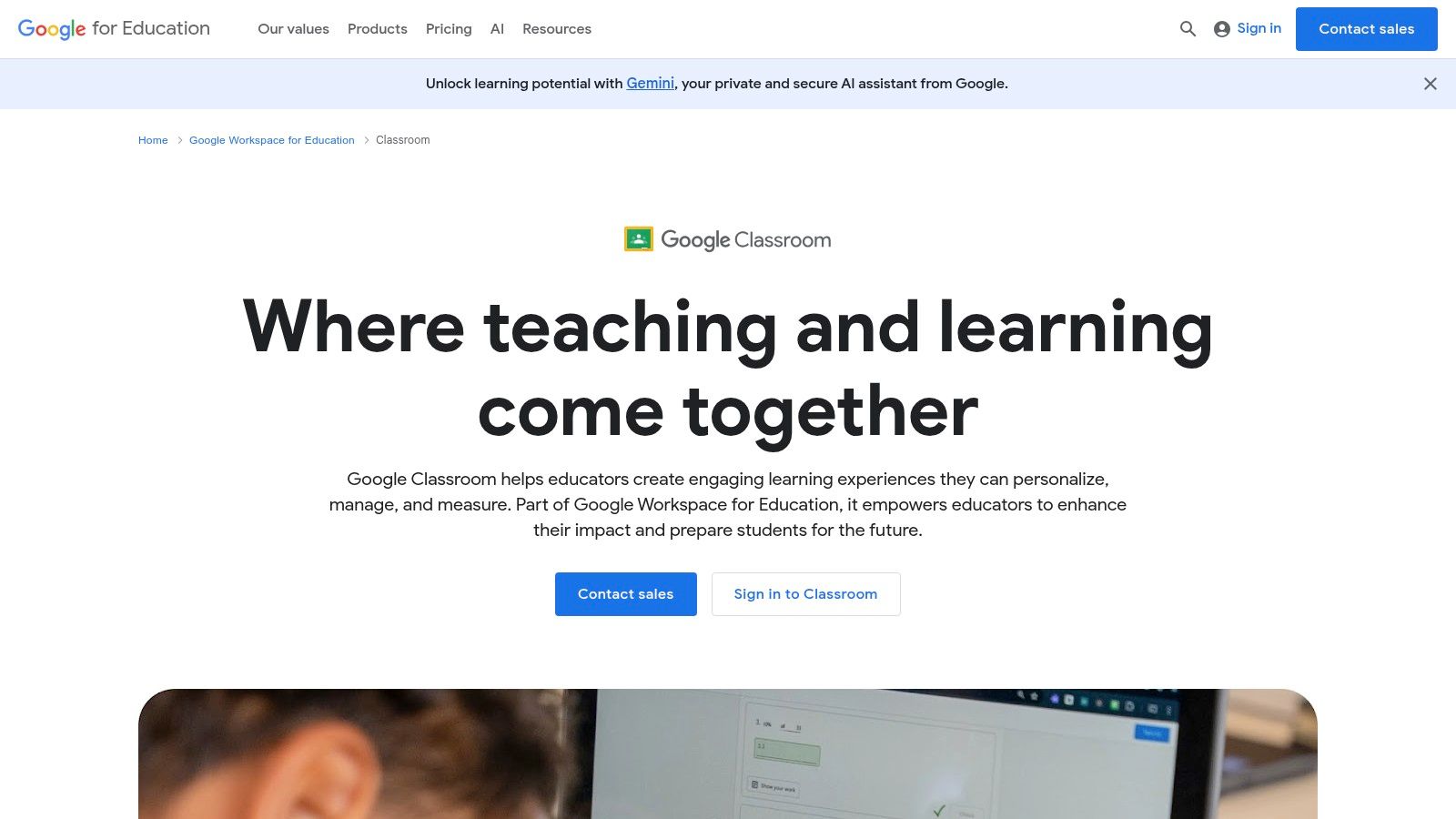
Google Classroom is a completely free and remarkably user-friendly platform. It's ideal for online educators, particularly those already working within the Google ecosystem. For Shopify store owners and arts and crafts business owners hosting online workshops, tutorials, or courses, Google Classroom offers a simple and effective learning management solution without the financial burden. Think about easily sharing downloadable PDF patterns, giving feedback on student projects within Google Docs, or holding live Q&A sessions using Google Meet.
Google Classroom streamlines the creation, distribution, and grading of assignments, simplifying file sharing between instructors and students. This is achieved through its seamless integration with other Google services like Docs, Sheets, Slides, Gmail, and Google Calendar. It acts as a central hub for all your teaching resources and communication needs.
Key Features of Google Classroom
- Assignment Creation and Distribution: Easily create and share assignments, quizzes, and announcements.
- Grading System with Feedback Options: Offer timely feedback and grades within the platform.
- Integration with Google Workspace: Works flawlessly with other Google tools for a streamlined experience.
- Communication Tools: Simplify communication with announcements, comments, and email integration.
- Mobile App for iOS and Android: Enables learning and teaching from anywhere, offering flexibility.
Pros of Using Google Classroom
- Free: It's completely free with a Google account, ensuring accessibility for everyone.
- User-Friendly Interface: Simple to navigate and use, regardless of technical skills.
- Seamless Google Integration: Utilizes the power of Google Workspace for a unified experience.
- Regular Updates and Improvements: Google consistently updates and enhances the platform.
Cons of Using Google Classroom
- Limited Customization Options: Functionality is robust, but customization options are basic.
- Requires Internet Connectivity: Offline access is restricted.
- Basic Assessment Tools: Assessment features are less comprehensive than dedicated Learning Management Systems (LMS).
- Limited Reporting Capabilities: Data analysis and reporting functions are basic.
For Shopify store owners showcasing new product features or arts and crafts business owners demonstrating a new technique, Google Classroom provides a straightforward way to engage with your audience. Share video tutorials through Google Drive, collect assignments, and provide personalized feedback, all within the familiar Google interface. Check out Key Tools for Online Educators for more information on using online educational tools.
Getting Started with Google Classroom
- Sign in with your Google account.
- Create a class.
- Add students (by email invitation or a unique class code).
- Begin creating and sharing assignments.
Website: https://classroom.google.com/
2. Moodle
Moodle is a free and open-source learning management system (LMS) ideal for building online courses. While its robust feature set might seem overwhelming for some Shopify or arts and crafts business owners, its flexibility makes it a powerful tool for those wanting to develop a comprehensive educational platform. Think beyond simple product tutorials and consider developing in-depth courses, membership communities, or ongoing training programs.
What sets Moodle apart? Unlike simpler platforms focused solely on content delivery, Moodle emphasizes pedagogical principles, meaning it's designed for effective teaching and learning. This is a great option for businesses that want customers to deeply understand their products and services.
Features for Shopify and Arts & Crafts Businesses
-
Customizable Course Content: Build courses with text, images, videos, and interactive elements. Teach the intricacies of jewelry making, the nuances of painting, or the secrets behind your product formulation.
-
Advanced Quiz and Assessment Options: Use quizzes, assignments, and peer evaluations to track student progress. This is crucial for confirming students understand the material and are developing their skills.
-
Collaborative Tools: Encourage interaction with forums, wikis, and workshops. Imagine your students sharing creations, troubleshooting together, and inspiring one another.
-
Comprehensive Grading Tools: Easily manage student grades and provide feedback.
-
Plugin System for Extended Functionality: Expand Moodle's capabilities with plugins, such as eCommerce integrations or advanced reporting tools.
Pros
-
Free and Open-Source: No licensing fees, so you can invest elsewhere.
-
Highly Customizable and Flexible: Tailor Moodle to your specific business needs and branding.
-
Strong Community Support: Benefit from a large, active community.
-
Extensive Documentation: Numerous guides and tutorials are available to help you along the way.
Cons
-
Steeper Learning Curve: Moodle is more complex than some drag-and-drop platforms and requires some technical proficiency.
-
Requires Technical Knowledge to Set Up and Maintain: You'll need some familiarity with web hosting and server administration.
-
Can be Overwhelming for New Users: The many features and options can feel intimidating at first.
-
May Require Hosting Costs: While Moodle is free, web hosting is not.
Implementation Tips
-
Start Small: Begin with a simple course and gradually add features.
-
Utilize the Documentation: Moodle's documentation can answer most of your questions.
-
Join the Community: Connect with other Moodle users for support and advice.
-
Consider Managed Hosting: If you lack technical skills, a managed hosting provider can handle the technical details.
Pricing: Free (software). Hosting costs vary.
Website: Moodle
Moodle deserves a spot on this list due to its powerful and flexible platform for comprehensive online learning. While it requires a greater initial time investment, the robust features and customization options make it valuable for businesses looking to build a thriving online community. While simpler platforms might work for basic tutorials, Moodle empowers you to create impactful learning experiences that increase customer engagement and build brand loyalty.
3. Edmodo
Edmodo is a free online teaching platform designed to connect teachers and students. While geared towards K-12, its features can be surprisingly helpful for Shopify store owners and arts and crafts businesses creating online courses or workshops. Imagine offering a free macrame course to boost macrame supply sales, or a paid pottery glazing workshop for your ceramic customers. Edmodo can help you achieve these goals.
How Edmodo Can Benefit Your Business
-
Building a Community: Edmodo’s social media-style interface creates a dedicated learning space. This fosters community around your brand and encourages customer engagement. Think of it as a private Facebook group focused on your niche, with added educational tools.
-
Delivering Structured Learning: Share resources, assignments, and quizzes on Edmodo. This structure enhances your brand's value, even for free courses. A Shopify store selling calligraphy supplies could offer a free introductory course.
-
Effective Communication: The platform provides direct communication channels between you and your students. This facilitates quick answers, feedback, and relationship building with your customer base.
-
Gauging Student Understanding: Quizzes and assessments help evaluate student learning and refine your content. This feedback loop ensures customers maximize the value of your educational materials.
Features
- Social media-style interface
- Resource sharing and assignments
- Quiz and assessment tools
- Parent/customer communication tools
- Mobile app for on-the-go learning
Pros
- Intuitive, Facebook-like interface.
- Built-in communication tools.
- Growing educational resource library.
- Free for core features.
Cons
- Premium features require a paid subscription.
- Limited integration with other educational tools.
- Fewer features than a full Learning Management System (LMS).
- Potential performance issues with large classes.
Pricing
Free for core features, with varying prices for premium features.
Technical Requirements
Internet access and a web browser or the Edmodo mobile app.
Why Edmodo Makes the List
Edmodo offers a simple, free way to create and deliver educational content. While a full LMS may be excessive for some small businesses, Edmodo strikes a user-friendly balance between a social media group and a complex learning platform. Its tools provide valuable opportunities to engage customers, build loyalty, and drive sales.
Implementation Tip
Start with a small, free course to test the platform and understand Edmodo's features. This allows you to evaluate its suitability for your business needs before paying for premium features.
Website
4. Canvas LMS
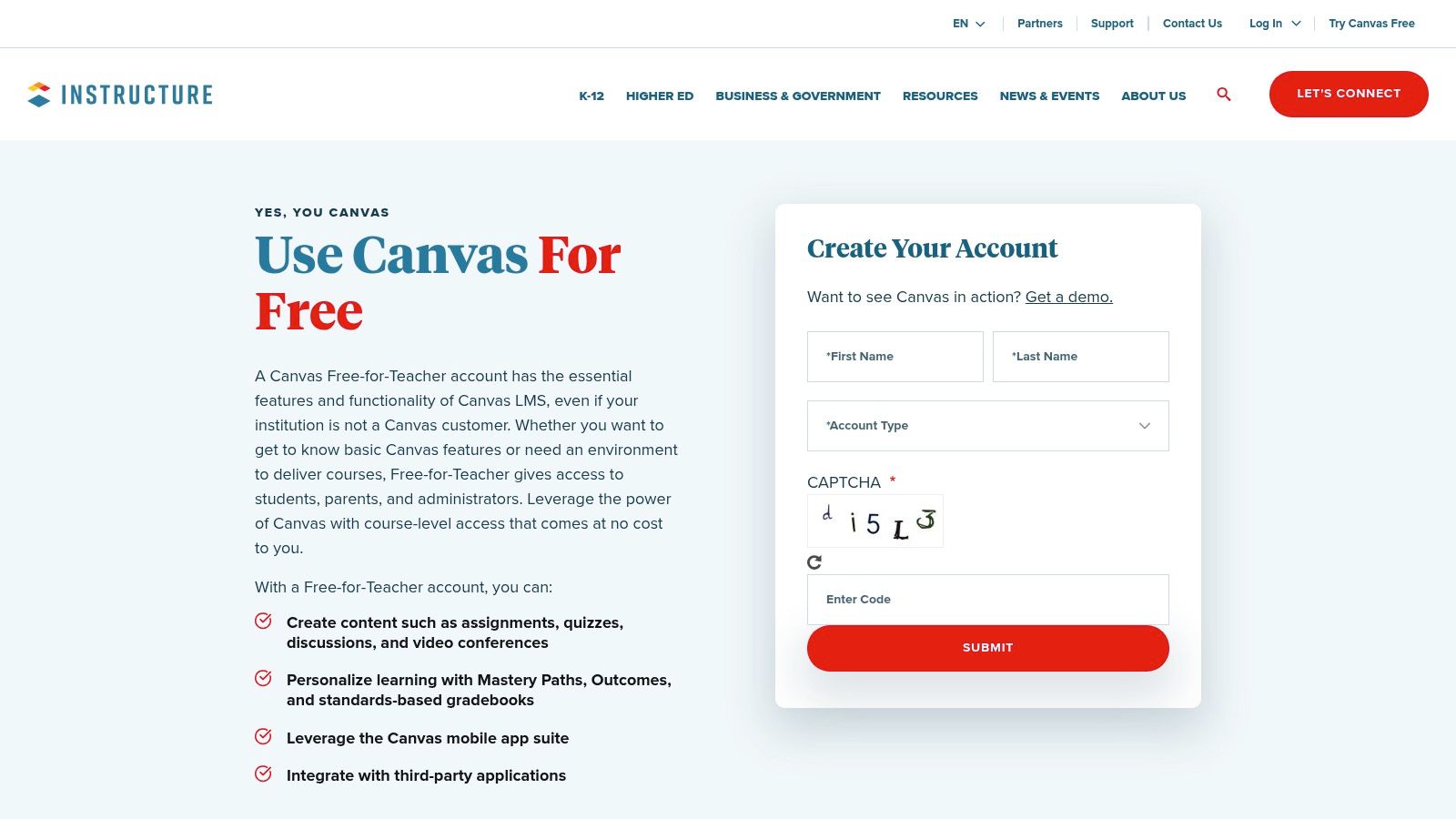
Developed by Instructure, Canvas LMS is a robust learning management system (LMS) widely used by educational institutions. While its institutional offerings are well-known, Canvas also provides a free version for individual teachers. This makes it a valuable resource for Shopify store owners and arts and crafts businesses looking to create online courses or workshops.
Whether teaching crafting techniques, demonstrating product usage, or offering training related to your Shopify store, Canvas can help organize your online teaching efforts. Its free tier offers a powerful set of tools for course creation, assignment management, and student interaction.
You can build structured learning paths, deliver quizzes and assignments, track student progress, and facilitate communication – all within a single platform. Features like SpeedGrader enable efficient assessment of student work. Built-in calendar and scheduling tools help keep everyone organized.
Features and Benefits
Here's a closer look at what Canvas offers:
- Intuitive course creation and management: Easily build and manage your courses, even with limited tech experience.
- Robust quiz and assignment tools: Create engaging assessments to test student knowledge.
- SpeedGrader for efficient assessment: Streamline grading and provide feedback quickly.
- Calendar and scheduling tools: Keep track of deadlines and important dates.
- Mobile apps for iOS and Android: Access and manage courses on the go.
Pros and Cons
Like any platform, Canvas has its strengths and weaknesses:
Pros:
- Modern, user-friendly interface: Canvas is easy to navigate, even for beginners.
- Extensive feature set: The platform supports a wide range of teaching styles and needs.
- Good mobile experience: Mobile apps offer convenient access for both teachers and students.
- Regular updates and improvements: Canvas is constantly evolving and improving.
Cons:
- Free version limitations: Some advanced features require a paid subscription.
- Feature overload: The extensive feature set can be overwhelming for simple projects.
- Learning curve: Mastering all features takes time and effort. For online course development best practices, you might find this helpful: Creating Online Courses: Expert Tips for Success.
Pricing and Technical Requirements
Canvas is free for individual teachers, with paid institutional plans available. The technical requirements are minimal: a computer or mobile device with internet access.
Comparison and Implementation Tips
Compared to platforms like Google Classroom, Canvas offers a more comprehensive set of tools, particularly in its free version. This makes it well-suited for complex learning scenarios.
To get started, explore the free resources and tutorials on the Canvas website. Familiarizing yourself with the platform’s interface and core functions is a great first step.
Website: https://www.instructure.com/canvas/try-canvas
5. Schoology: Bringing The Classroom Online
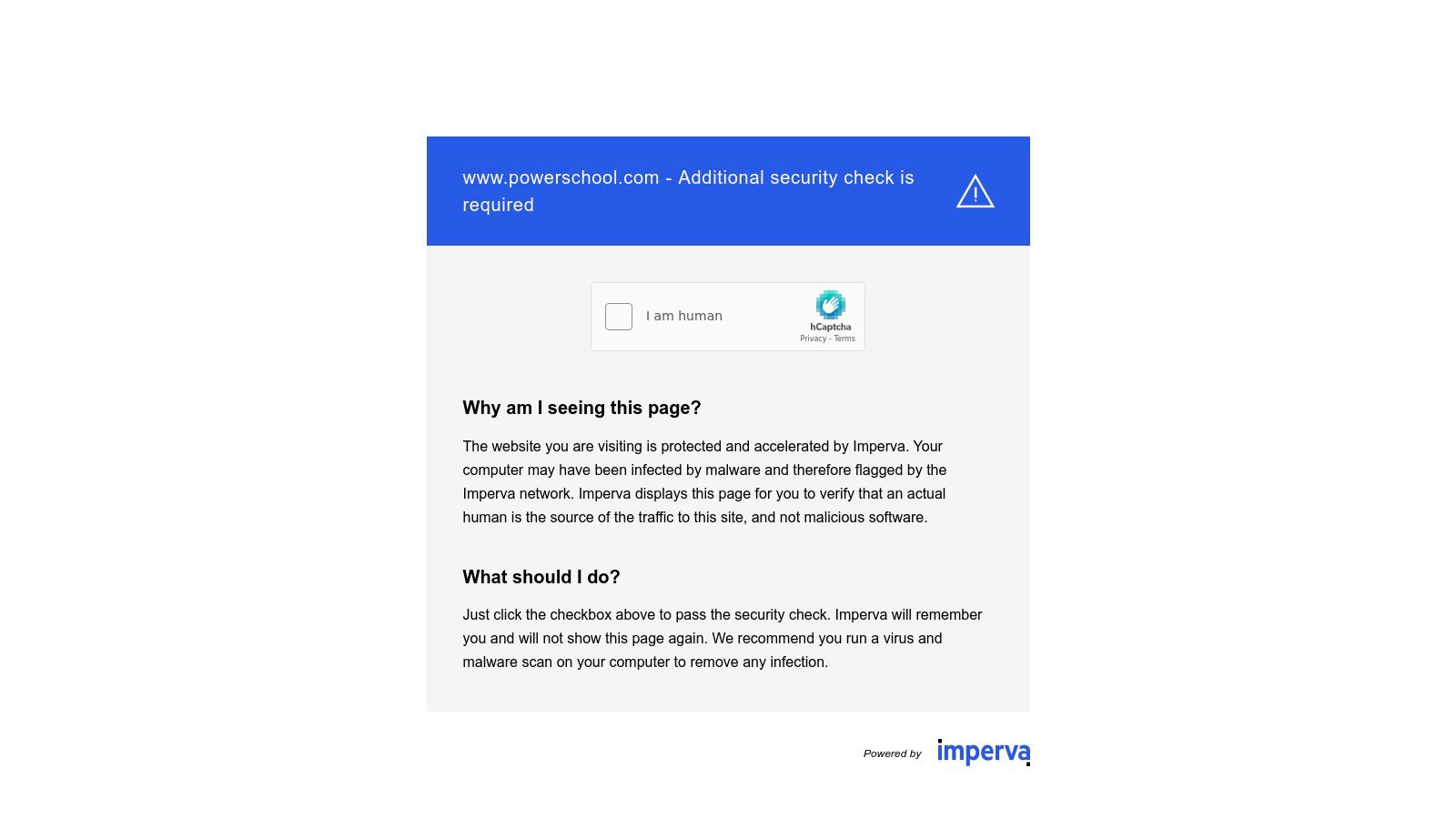
Schoology is a robust and versatile learning management system (LMS). It's ideal for Shopify store owners and arts and crafts business owners wanting to create and deliver online courses or workshops. Whether teaching a new crafting technique, demonstrating product usage, or building a community, Schoology provides the tools to manage online educational content effectively.
Schoology's familiar social media-like interface makes it easy to use for both instructors and students. The platform allows you to create structured learning experiences. Features include course creation tools, assessment and grading systems, and detailed learning analytics. Think of it as your central hub for creating, delivering, and tracking the success of your online teaching.
How Shopify & Arts/Crafts Businesses Can Use Schoology
-
Product Tutorials & Workshops: Host step-by-step video tutorials showcasing your Shopify products. Create interactive workshops focused on your crafting supplies. Schoology's course structure helps break down complex projects into digestible modules.
-
Building a Community: Use Schoology’s communication tools to create a thriving community around your brand and products. Consider discussion forums and live Q&A sessions to encourage interaction.
-
Membership-Based Content: Offer exclusive online courses or workshops as part of a paid membership through your Shopify store. Schoology helps manage access and deliver premium content to subscribers.
-
Certification Programs: For crafts businesses, offer certification programs for specific techniques or skills. This adds value to your offerings and attracts a dedicated audience.
Features and Benefits
-
Course and Content Creation: Easily build and organize courses with multimedia content, assignments, and quizzes.
-
Assessment and Grading: Automate grading and provide personalized feedback, making your workflow more efficient.
-
Parent Access (If Applicable): Parents can track their children’s progress, which is helpful for craft courses for younger audiences.
-
Learning Analytics: Monitor student engagement and identify areas for improvement in your course material.
-
Free Basic Version: A free account offers core functionality for individual teachers.
Pros and Cons
Here's a quick overview of the advantages and disadvantages:
| Pros | Cons |
|---|---|
| Intuitive, social media-like interface | Advanced features require a paid institutional subscription |
| Robust communication tools | Mobile app can have performance issues |
| Excellent resource organization | Limited customization in the free version |
| Free basic version for individual teachers | Some features have a learning curve |
Pricing and Technical Requirements
Schoology has a free basic plan for individual teachers. Paid subscriptions unlock advanced features and institutional licenses. Check their website for detailed pricing. A stable internet connection and a modern web browser are all you need to access Schoology.
Implementation Tips
-
Start Free: Explore the free version to see if the platform meets your needs.
-
Plan Ahead: Outline your course structure and content before setting up your account.
-
Build Community: Use the communication tools to create a dynamic learning environment.
-
Explore Integrations: Connect Schoology with other tools you use, such as your Shopify store or Mailchimp for email marketing.
Website: https://www.schoology.com/
Schoology is a user-friendly platform for online teaching. Whether you're a Shopify store owner demonstrating products or a crafts business owner sharing expertise, its features, interface, and free basic plan make it a valuable resource for building an online learning community.
6. Khan Academy
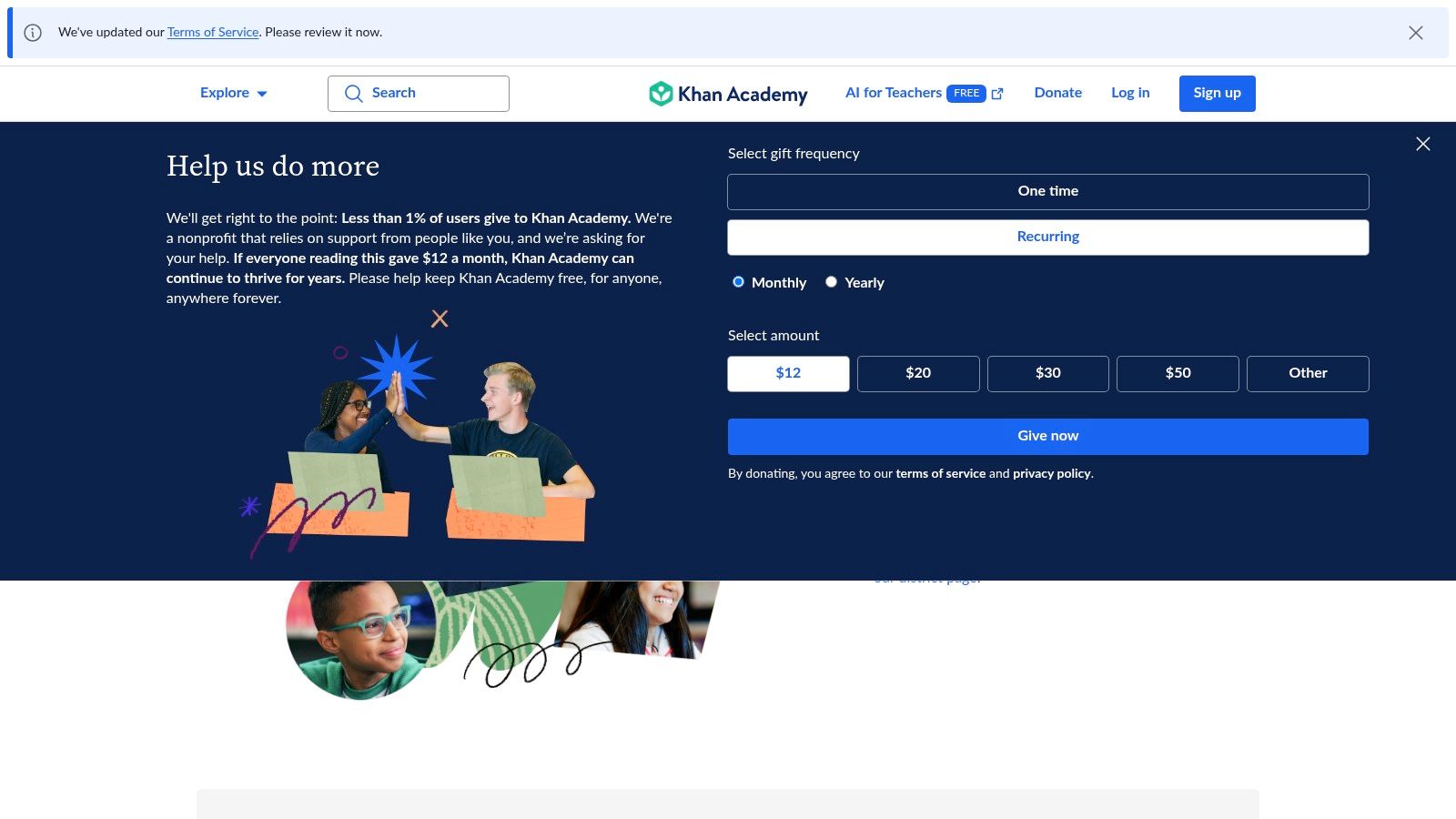
Khan Academy stands out for its impressive collection of free, high-quality educational resources. This makes it a truly valuable asset for Shopify store owners and arts and crafts business owners alike. Whether you're looking to improve your own skills or provide training for employees, Khan Academy can help. While not a full-fledged Learning Management System (LMS), its focused, mastery-based approach can be incredibly effective.
Khan Academy is a non-profit offering a wealth of educational resources, primarily focused on math and science. It also branches into humanities, economics, and computing. While it might not be the first platform business owners consider, it offers practical applications. It's particularly useful for strengthening those all-important foundational skills.
Practical Applications For Business Owners
Here's how Khan Academy can make a difference:
-
Financial Literacy: A solid grasp of financial statements, budgeting, and profit margins is essential for any business owner. Khan Academy’s economics, finance, and accounting resources provide a great foundation and are helpful refreshers for Shopify store owners managing their online businesses.
-
Data Analysis & Interpretation: Data is crucial for online success. Khan Academy's math and statistics courses help business owners understand data analytics, interpret sales trends, and make data-driven decisions based on website traffic and customer behavior.
-
Skill Development for Artisans: Geometry and trigonometry might not seem like obvious choices for artists, but they're surprisingly useful. They can help craftspeople with measurements, angles, and proportions, enabling them to design complex patterns and scale designs for different product sizes.
-
Employee Training: Onboarding new employees? Khan Academy offers a cost-effective way to provide standardized training on basic computer skills or math for inventory management. It's a fantastic resource for upskilling your team.
Features and Benefits of Khan Academy
Khan Academy offers a range of useful features:
- Extensive library of pre-made content on various subjects
- Interactive exercises and quizzes
- Progress tracking and reporting
- Mastery-based learning
- Personalized learning dashboard
Pros:
- Free Access: No subscription fees.
- High-Quality Content: Lessons are well-structured and easy to understand.
- Self-Paced Learning: Learners progress at their own speed.
- Multiple Languages: Accessible to a broader audience.
Cons:
- Limited Content Customization: You can't edit lessons or create your own.
- No Content Creation: It's a content delivery platform, not a creation tool.
- Focus on Math and Science: While expanding, these remain its core strengths.
- Not a Full LMS: It lacks the advanced features of a dedicated LMS.
Website: https://www.khanacademy.org/
Technical Requirements: Internet access and a web browser.
Implementation Tips
- Identify skill gaps within your business.
- Use Khan Academy's search function to find relevant lessons.
- Encourage employees to create free accounts to track progress.
- Supplement Khan Academy with other resources for a comprehensive training program.
While platforms like Coursera or Skillshare offer more business-specific courses (often at a cost), Khan Academy's free, high-quality foundational learning makes it an invaluable supplementary tool. It’s especially beneficial for bootstrapped businesses or those wanting to strengthen core skills.
7. Nearpod
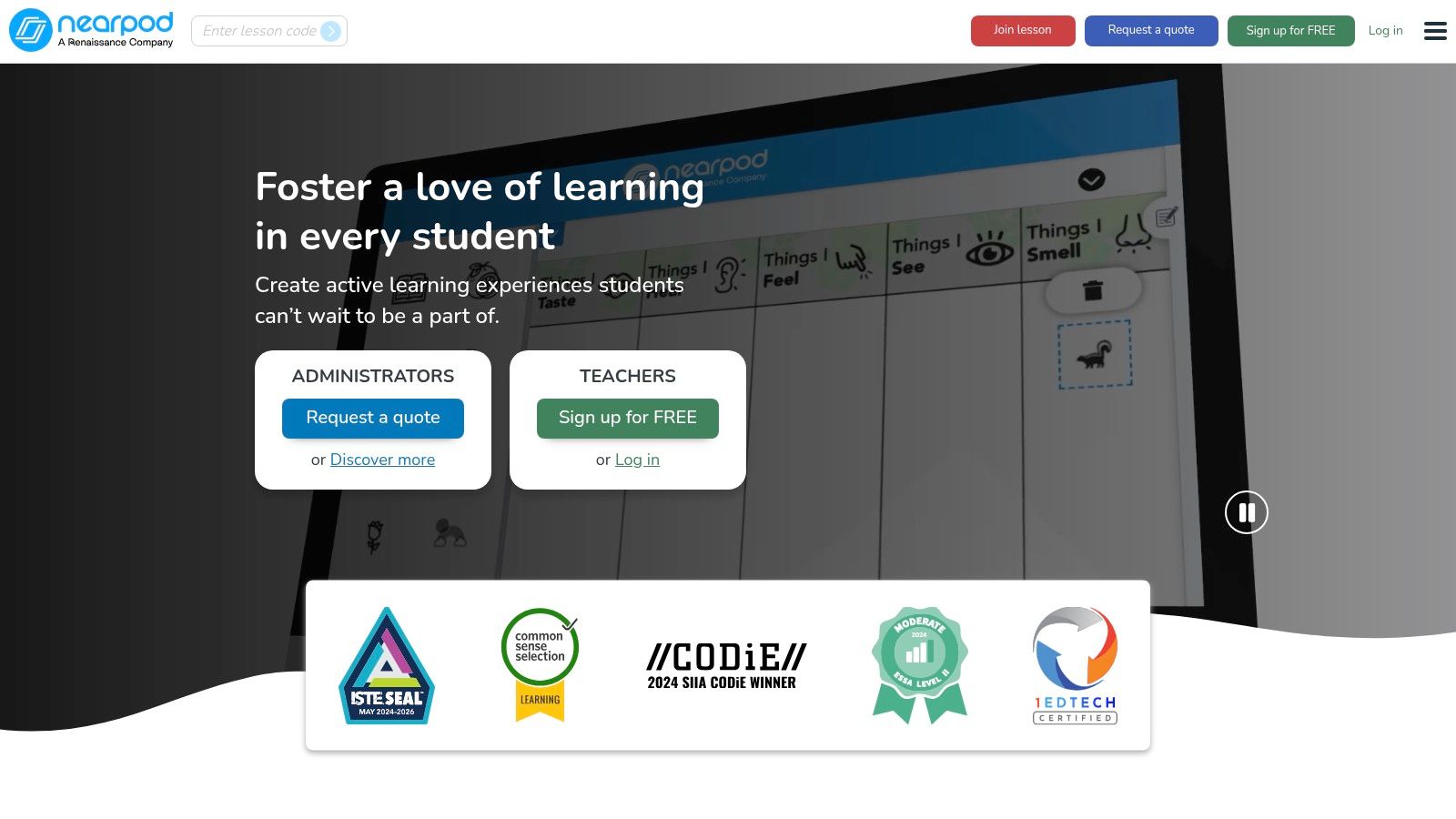
Nearpod is a valuable tool for engaging online teaching. Shopify store owners and arts and crafts business owners can use it to connect with their audience and train teams creatively. Imagine turning a typical product demo into a captivating interactive experience. Or picture onboarding new employees with a virtual tour of your workshop. Nearpod makes these scenarios possible.
Nearpod is an interactive classroom tool for creating engaging lessons, collaborative activities, and formative assessments. It moves beyond static presentations, embracing dynamic learning. Think quizzes, polls, videos, collaborative boards, and even virtual reality field trips. This platform allows you to actively involve your audience, whether they are customers or team members.
Real-World Applications
A Shopify store owner could use Nearpod to create an interactive lesson about a new skincare line. Quizzes could test product knowledge, and polls could gather customer preferences. An arts and crafts business owner might lead a virtual workshop using the collaborative board feature for real-time feedback.
Nearpod offers a free basic plan to get started and explore core features. However, the free version has limited storage and feature access. A paid subscription unlocks expanded storage and premium features like virtual reality field trips and advanced reporting. For more insights on maximizing engagement, check out this article on The Role of Interactive Media in Online Courses.
Technical Requirements and Considerations
Nearpod’s technical requirements are minimal, working across multiple devices (desktops, laptops, tablets, and smartphones). However, some interactive features might perform better on tablets due to screen size and processing power. Bandwidth is another important factor, especially when using videos and virtual reality elements.
Features:
- Interactive lesson delivery
- Real-time student engagement tools
- Virtual reality field trips
- Formative assessment options
- Ready-to-run lesson library
Pros:
- Highly engaging for students
- Real-time feedback and assessment
- Works across multiple devices
- Free version available
Cons:
- Limited storage on the free account
- Advanced features require a paid subscription
- Can be bandwidth-intensive
- Some features are optimized for tablets
Website: Nearpod
Using Nearpod's interactive capabilities, businesses can create immersive and engaging online training experiences. This leads to better knowledge retention, improved learning outcomes, and a more effective way to connect with your audience. Ultimately, Nearpod can help you achieve your business goals.
8. ClassDojo
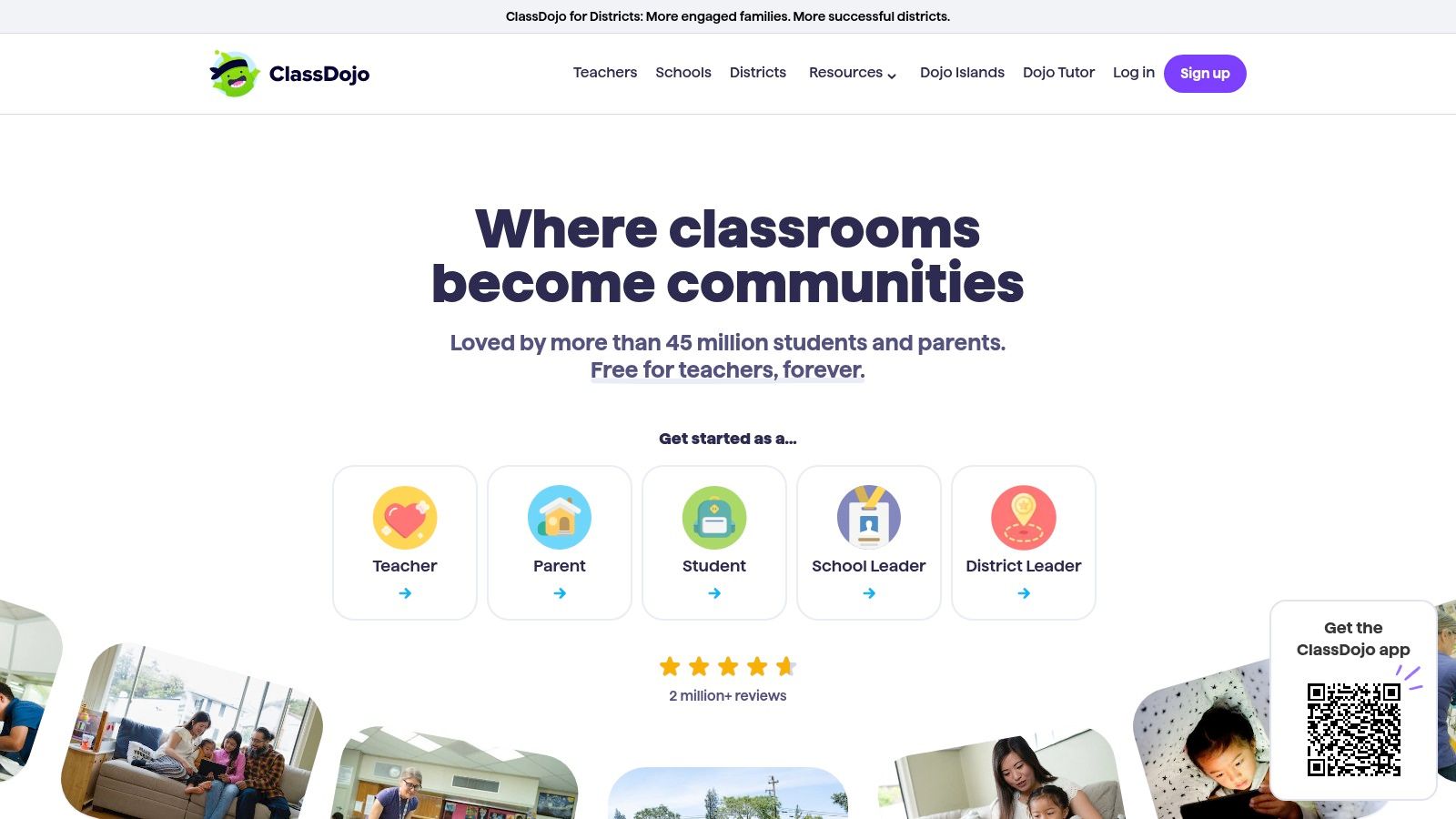
ClassDojo stands out as a helpful tool for Shopify store owners and arts and crafts business owners teaching online workshops. This is especially true for those targeting a younger demographic. While not a full-fledged Learning Management System (LMS) like some other platforms, ClassDojo excels at building community and simplifying communication. These features are key for student engagement and retention.
ClassDojo is primarily a school communication platform designed to connect teachers, students, and parents. It acts as a central hub for the digital classroom. Though geared toward traditional classrooms, its features work well for online teaching, particularly for the visual and interactive learning experiences common in arts and crafts.
How Shopify & Arts/Crafts Business Owners Can Use ClassDojo
Here are several ways ClassDojo can benefit your online teaching business:
-
Showcase Student Creations: The portfolio feature allows you to display student project photos and videos. This showcases student accomplishments and provides valuable marketing content for your business. Imagine a gallery of student-crafted jewelry or pottery!
-
Build Excitement & Community: Keep students engaged between classes by sharing updates, reminders, and behind-the-scenes peeks into your creative process.
-
Provide Personalized Feedback: The messaging feature enables individual feedback and quick responses to student questions, creating a supportive learning environment.
-
Parent Communication (If Applicable): For those who teach children or teens, ClassDojo's parent communication features keep parents updated on their child’s progress and upcoming class activities.
-
Behavior Management: The points system can be adapted to gamify learning and encourage participation in online challenges and activities. This works particularly well with younger students.
Features
ClassDojo offers several key features:
- Behavior management system
- Digital portfolio for student work
- Parent-teacher communication
- Class community building tools
- Classroom moments sharing
Pros
-
Free Platform: ClassDojo is free, removing a significant financial barrier for new online teachers.
-
Engaging Interface for Younger Students: The colorful, character-based design appeals to children and makes online learning more enjoyable.
-
Strong Parent Communication Component: A valuable asset for businesses that teach children.
-
Easy to Use: ClassDojo is easy to learn and use, requiring minimal training.
Cons
-
Not a Full LMS: ClassDojo lacks features like grading, advanced assessments, and complex course structuring found in dedicated LMS platforms like Moodle or Google Classroom.
-
Limited Assessment Capabilities: Provides basic feedback options but lacks complex grading or analytics.
-
Focused on Elementary Education: Some features may feel less relevant for adult learners.
-
Basic Content Delivery: ClassDojo can share photos, videos, and messages, but isn't designed for delivering large amounts of structured learning content.
Comparison With Similar Tools
While ClassDojo focuses on communication and community, platforms like Google Classroom and Moodle offer more comprehensive LMS features. Choose ClassDojo if community building and engaging younger learners are your priorities.
Implementation Tips
- Create a dedicated "class" for each workshop or course.
- Encourage students to personalize their avatars.
- Regularly share photos and videos of student work.
- Use the messaging feature for individual feedback.
Website: https://www.classdojo.com/
9. Loom For Education
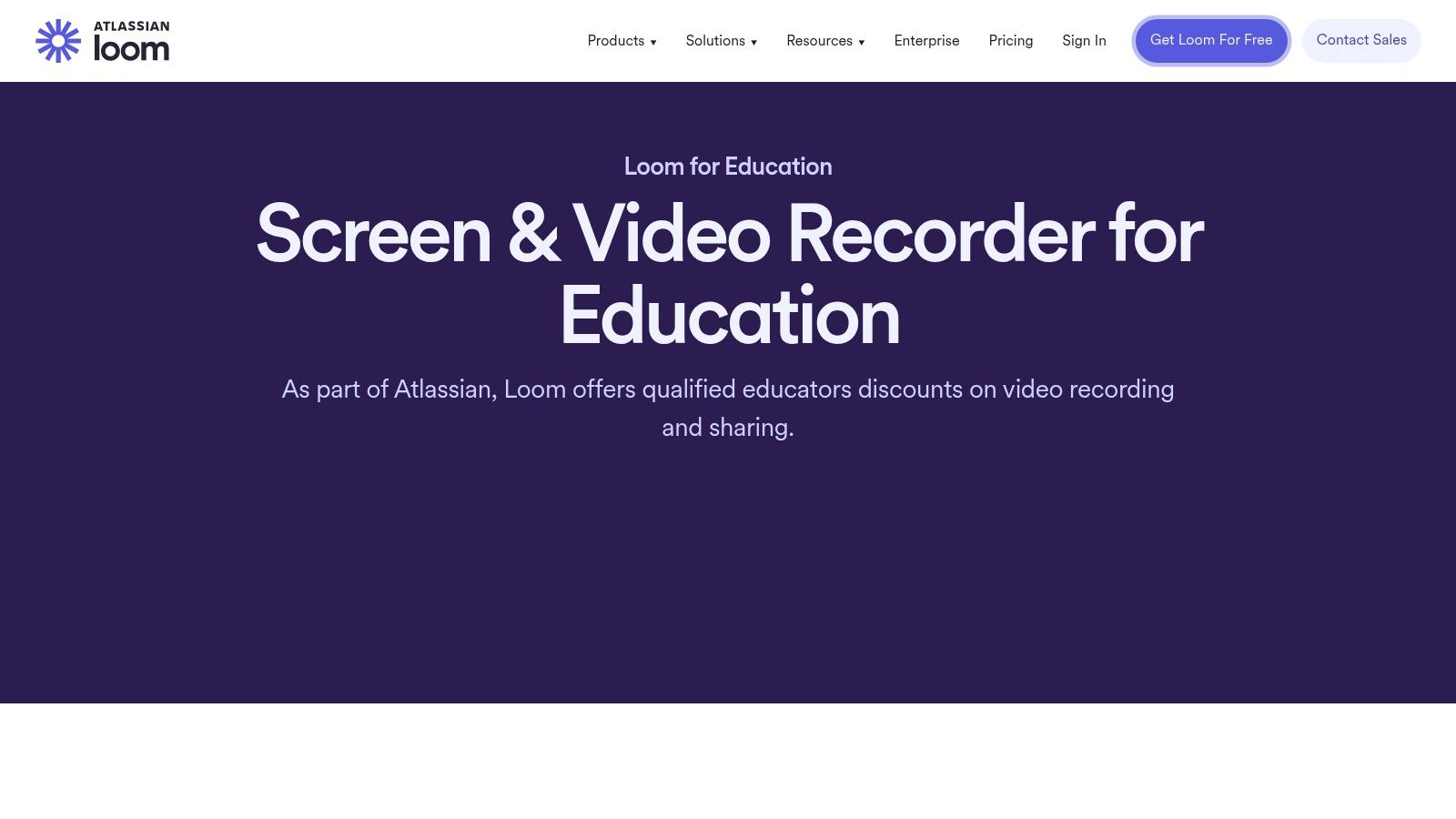
Loom for Education is a user-friendly tool for crafting compelling video content, especially for asynchronous learning environments. While not a full learning management system (LMS) like Moodle, its free Pro features for educators make it a valuable supplemental resource for Shopify store owners and arts and crafts business owners alike. Imagine producing high-quality instructional videos without needing specialized software or expensive equipment. That’s the convenience Loom offers.
For Shopify store owners, Loom can be incredibly helpful. Create tutorials showcasing new product features, demonstrating crafting techniques, or clarifying store policies. Show customers how to use your latest gadget, put together a DIY kit, or care for a handmade item. Concise, engaging videos add value for customers and can minimize customer service inquiries.
Arts and crafts business owners can use Loom to host online workshops, demonstrate intricate techniques, or provide personalized student feedback. Build a library of helpful how-to videos. Sharing the detailed steps of a complex weaving pattern or the proper use of a specific pottery tool becomes simple and engaging with Loom's screen recording and webcam features.
Key Features And Benefits
- Screen recording with webcam overlay: Record your screen and yourself simultaneously, fostering a personal connection. This is ideal for software demos or hands-on processes.
- Video hosting and sharing: Loom hosts your videos. Sharing is as easy as copying and pasting a link – no need for separate video hosting platforms.
- Interactive elements: Loom allows for emoji reactions and comments, enabling audience engagement and feedback.
- Video editing capabilities: Edit your videos directly within Loom, ensuring a polished final product.
- Analytics on video views: Track viewer engagement to see what resonates with your audience.
Pros
- Free Pro version for verified educators: Access essential features without cost.
- Easy asynchronous content creation: A flexible way to create and share educational content for busy entrepreneurs.
- No recording time limits for educators: Create in-depth tutorials and workshops.
- Simple link sharing: Embed videos on your Shopify store, website, or social media platforms.
Cons
- Not a full teaching platform: Loom lacks features found in dedicated LMS platforms, such as quizzes and assignments.
- Primarily for content delivery: While comments and reactions allow some interaction, it isn't designed for live, back-and-forth discussion.
- Requires reliable internet: Creators and viewers need a good internet connection.
- Limited assessment capabilities: Loom isn't ideal for assessing student learning.
Implementation Tips
- Keep videos concise: Respect your audience’s time.
- Invest in a good microphone: Clear audio is essential for a professional video.
- Plan your content: An outline or script can help you stay focused.
- Use visuals effectively: Combine screen recordings with clear visuals to engage viewers.
Website: Loom for Education
Loom for Education is a great way for Shopify and arts and crafts business owners to create and share engaging video content without a steep learning curve. While it won't replace a full online learning platform, its ease of use and powerful features make it a valuable tool for enhancing your online presence.
10. Quizlet
Quizlet is a popular learning platform known for its engaging study tools. While it’s often associated with students, its versatility makes it a valuable asset for various learning contexts, including businesses like Shopify stores and arts and crafts ventures. Think outside the traditional classroom and imagine easily training your team, creating interactive tutorials, or even building a community around shared knowledge.
How Shopify and Arts & Crafts Businesses Can Use Quizlet
-
Product Knowledge Training: Use Quizlet's flashcards and games to train your staff on product details, variations, and key selling points. This is especially helpful for businesses with extensive inventories or complex products.
-
Craft Technique Tutorials: Break down intricate crafting techniques into manageable steps using flashcards. Each card can visually demonstrate a specific step, creating an engaging and interactive learning experience.
-
Community Building: Develop study sets related to your niche, such as types of clay, painting styles, or jewelry-making techniques. Share these sets with your customer base to foster a sense of community and establish yourself as an expert.
-
Interactive Workshops: Enhance online workshops or courses by using Quizlet sets for pre-workshop preparation or post-workshop review. This reinforces key concepts and promotes active learning.
-
Terminology and Definitions: Create flashcards to help your audience understand industry-specific jargon related to your products or craft. Clearer communication builds trust and understanding.
Features of Quizlet
-
Flashcard Creation and Sharing: Design and customize flashcards with text, images, and audio. Share your sets publicly or privately with specific groups.
-
Multiple Study Modes: Provide learners with diverse ways to engage with the material through modes like Learn (adaptive practice), Test (practice quizzes), and Match (a fast-paced matching game).
-
Ready-Made Content: Explore the extensive library of pre-made study sets created by other users, saving you valuable time and effort.
-
Class Creation and Progress Tracking (Teacher Account): With a paid Teacher subscription, create classes, assign sets, and monitor student progress.
-
Mobile App: The Quizlet mobile app empowers learners to study on the go, reinforcing knowledge anytime, anywhere.
Pros of Using Quizlet
-
Free Core Features: Enjoy access to most of Quizlet’s functionality without any cost.
-
Engaging Study Games: The platform’s gamified approach boosts motivation and improves knowledge retention.
-
Extensive Pre-Made Content Library: Save time and effort by leveraging existing study sets.
-
Popular Among Students: The familiar interface makes it easy for many learners to adapt quickly.
Cons of Using Quizlet
-
Advanced Teacher Features Require Paid Subscription: Features like progress tracking and class management necessitate a paid subscription.
-
Primarily for Review Rather than Instruction: Quizlet is best suited for reinforcing existing knowledge, rather than introducing entirely new concepts.
-
Limited Assessment Options: The assessment features are basic and may not be sufficient for formal evaluations.
-
Focus on Memorization over Higher-Order Thinking: While effective for memorization, Quizlet may not actively promote critical thinking or deeper understanding.
Pricing and Technical Requirements
Pricing: Free for basic features; paid Teacher subscriptions are available for enhanced features.
Technical Requirements: Internet access and a web browser or the Quizlet mobile app.
Quizlet’s user-friendly interface, engaging format, and accessibility make it a valuable tool. While not a comprehensive teaching platform on its own, its versatility allows creative applications for training and educational purposes for both Shopify and arts & crafts businesses. It’s a powerful way to reinforce knowledge and build community in an accessible and enjoyable format.
Free Online Teaching Platforms: Quick Comparison
| Platform | Notable Features ★ | UX & Support 🏆 | Pricing & Value 💰 | Target Audience 👥 | Unique Aspects ✨ |
|---|---|---|---|---|---|
| Google Classroom | Assignment management, G Suite integration | Intuitive, accessible | Free | K-12 educators, schools | Seamless Google ecosystem integration |
| Moodle | Customizable courses, advanced quizzes | Flexible yet steeper learning curve | Free (hosting may apply) | Institutions, educators | Open source flexibility |
| Edmodo | Social media-style, resource sharing | Engaging, collaborative | Free with premium options | K-12 teachers and parents | Strong parent-teacher communication |
| Canvas LMS | Robust course creation and SpeedGrader | Modern, user-friendly | Free basic version; Paid tiers | Educators, institutions | Comprehensive, all-in-one toolset |
| Schoology | Course creation, assessment tools | User-friendly with community feel | Free basic / Premium options | Schools, districts, teachers | Social learning integration |
| Khan Academy | Vast video library, mastery-based learning | High-quality, self-paced | Completely Free | Students, self-learners | Extensive, globally accessible content |
| Nearpod | Interactive lessons, VR field trips | Highly engaging, real-time feedback | Free basic; Subscription plan | K-12 educators | Real-time interactivity and immersive learning experiences |
| ClassDojo | Behavior management, digital portfolios | Simple, kid-friendly | Free | Elementary educators, parents | Focus on community and classroom bonding |
| Loom for Education | Video messaging, screen recording | Easy, efficient content delivery | Free Pro for verified educators | Educators producing video | Asynchronous video communication with editing and analytics |
| Quizlet | Flashcards, varied study modes | Engaging, gamified interface | Free core; Paid teacher upgrades | Students, educators | Gamified study experience with extensive content library |
Choosing the Right Free Online Teaching Platform
The right free online teaching platform can significantly improve your teaching and help you create dynamic, engaging lessons. Whether your priority is easy integration with your current tools, interactive features, or robust communication, a free platform exists to meet your needs.
When choosing among free platforms like Google Classroom, Moodle, Edmodo, Canvas LMS, Schoology, Khan Academy, Nearpod, ClassDojo, Loom for Education, and Quizlet, consider these factors:
-
Implementation and Getting Started: How easy is setup and use? Some platforms are more intuitive. If you're not tech-savvy, ease of use is paramount. Look for clear documentation and helpful support.
-
Budget and Resources: While these platforms are free, some offer premium features for a fee. Does the free version meet your needs? Are paid upgrades affordable? Consider the time investment for learning and managing the platform.
-
Integration and Compatibility: How does the platform integrate with your existing tools, especially your Shopify store? Does it support your file types? Can you easily share content between platforms? Seamless integration saves time and effort.
-
Teaching Style and Subject Matter: The ideal platform depends on how and what you teach. Some platforms are better for visual learners, while others excel at collaborative projects. Consider which features best support your teaching style and your students' needs.
Key Takeaways
-
Free Doesn't Mean Featureless: Many free platforms offer robust tools for engaging online learning.
-
Consider Your Technical Skills: Choose a platform you're comfortable using, one that doesn't require extensive technical expertise.
-
Integration Is Key: Seamless integration with your current tools, especially your Shopify store, streamlines your workflow.
-
Think About Your Teaching Style: Choose a platform aligned with your methods and your students’ needs.
If you own a Shopify store and need a deeply integrated solution to sell digital courses and products without managing multiple platforms, Tevello might be the ideal solution. Stop juggling separate systems and start leveraging a unified platform designed for Shopify. Streamline your operations, enhance customer experience, and boost sales with Tevello’s integrated courses, communities, and automated workflows. Take your Shopify store to the next level. Visit Tevello today and discover how to create a thriving online learning and selling ecosystem within your existing storefront.

